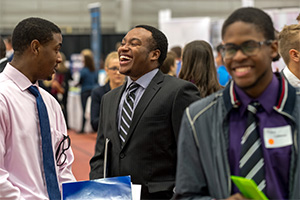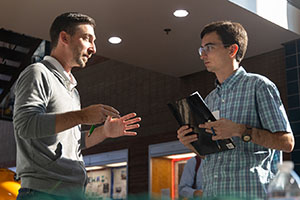16 ways your college career center can help your job search
Did you know your chances of career success multiply if you do this one thing in college?
Make good use of your campus career center.
Graduates who received help understanding career opportunities, planning their paths and connecting with employers were up to 6.3 times more likely to excel in career mobility, according to the latest National Alumni Career Mobility Annual Report.
Explore the Career Development Center and find out how CMU can help you prepare for your career.
See resourcesSo, what can you expect from a career center? Read on for over a dozen ways your career center can help you get started planning your career path.
What is a career center?
Career centers offer far more than résumé printing—they’re your go-to resource for figuring out your next steps!
 Career centers are there to help you answer important questions, like:
Career centers are there to help you answer important questions, like:
What are my career goals?
How can I find a job?
How do I prepare for a job interview?
They can help you discover the best-fitting major, explore career options, search for jobs or work toward landing a dream role. And, they’ll help with interview tips, personal branding and even build up your confidence as you make progress towards your career.
How do students use career centers?
The Student Voice survey by Inside Higher Ed gives us a glimpse into what students value most when it comes to career services. Top on their list? Choosing a major (41%) and career exploration (41%). Recruitment events (40%) and résumé help (39%) are close behind. Plus, about 27% of students head to career centers for help with creating a career plan.
Taking advantage of these services can be a real game-changer, but knowing where to start can feel overwhelming. You don't have to have it all figured out before you walk through the door. That's the whole point of career centers! They exist to help you discover what's possible – and then take your first steps towards your career goals with a solid plan.
What are my career goals?
The first step in figuring out where you’re headed is understanding what you’re working with. Career counseling is a great place to start. During one-on-one sessions with advisors, you’ll talk through your goals, strengths and ideas about your future. Some counselors specialize in specific fields like pre-law or pre-med. They can even help you choose a program that fits your vision for the future.
Some counselors specialize in specific fields like pre-law or pre-med. They can even help you choose a program that fits your vision for the future.
And if you’re not sure what that vision looks like yet—don’t worry! They're there to be your guide.
Here are some ways a career center can help you plan out your career goals:
- Self-assessment and job-fit tools: Identify skills, interests and values that can guide you toward potential career paths.
- Career exploration: Research various career paths and industries.
- Major selection: Work with a counselor to explore major options and select one that aligns with your career goals.
- Four-year plan guidance: Develop a career plan with steps like networking, internships and leadership to align activities with long-term goals for graduate school or the job market.
- Student organizations: Identify and join clubs related to your career goals, like pre-professional clubs or volunteer associations.
How do I find a job?
It’s time to put all your hard work into action and get you working! Your school’s career center will likely host conferences, workshops and seminars to keep you in the loop on industry trends while helping you meet the right people. They can even organize interviews or job shadowing with professionals in the field to help you gather information first-hand.
You can think of career fairs and networking events as professional matchmaking—connecting you with potential employers, showcasing industries and uncovering job or internship opportunities.
Why work with a career center when you're looking for an internship?
Because, "students whose career centers help them find an internship are 2.2 times more likely to get a paid internship than an unpaid internship or no internship it all" (Inside Higher Ed).
Here are some ways a career center can help you find work:
- Job postings and internships: Access job and internship databases.
- Application process: Tips for filling out your profile documents during a job application.
- Career fairs and networking events: Connect with employers, meet industry professionals, explore different industries and discover job openings.
- Alumni networks: Connect with alumni in your field of interest.
- Industry events: Attend conferences, workshops and seminars to network and stay updated.
- Informational interviews: Learn about careers by talking to professionals in your field.
- Job-shadowing: Observe professionals to understand their daily work.
And don’t forget alumni networks! They’re like having a cheat sheet—grads who’ve been where you are and can offer advice, insights and maybe even job leads. Using these resources is about more than landing the first job (though that’s a huge win!). It’s about setting yourself up for long-term success.
How do I prepare for a job interview?
The next step is figuring out how to showcase your skills, experience and personality to employers.
The résumé
Career centers are great for offering recommendations and tips to polish up your résumé, cover letter, portfolio or even your LinkedIn profile.
Throughout your classes, you might update your résumé or create a portfolio as part of an assignment—don’t hold back! Use those projects and your professor’s feedback to your advantage. Then, when you bring it to the career center, they can help you take what you’ve already built to the next level.
However, a great résumé is only part of the equation.
The look
 Depending on your industry, dressing a certain way can make a big difference when you meet employers in person or over video.
Depending on your industry, dressing a certain way can make a big difference when you meet employers in person or over video.
Some campuses even offer services to help you get fitted for professional clothes—perfect for interviews or networking events. Feeling good in what you’re wearing will give you a confidence boost – and let’s be real – that’s always helpful when nerves kick in.
The pitch
Knowing how to answer, "Tell me about yourself," strategically and without panicking is a real skill – and one that gates easier with practice. Career centers can help you practice your in-person performance. They’ll walk you through mock interviews, ask questions, listen carefully to your answers and give you personalized feedback. That way, you’ll be ready to put your best foot forward and impress potential employers.
Here are some ways a career center can help prepare for an interview:
- Résumé and cover letter workshops: Assist students in crafting tailored, effective application materials.
- Mock interviews: Offer a safe space to practice and refine interview skills.
- Clothing services: Provide access to professional attire for interviews and events, ensuring all students can present confidently.
- Job search strategies: Share tips and resources for finding job opportunities, including networking events and online job boards.
What can I do for my career goals right now?
Evaluate your strengths
Take advantage of online tools to figure out your skills, interests and values. These assessments can help point you toward career paths that might be a great fit for you.
Some popular options include the Strong Interest Inventory, the Myers-Briggs personality test and Focus2. The best part? You can probably set up a free account using your university email.
Connect
You can also check out student organizations that match your interests—or start your own! It’s a great way to test the waters and figure out what feels right for you. Joining a rock climbing club might not directly lead you to decide on pre-med, but it could help you build a support network of people in the same boat. Talking things out and hearing new perspectives can make a huge difference. Never underestimate the power of community!
Gather your evidence
Save yourself time in the future by gathering school projects, personal projects and records that you feel you paint you and your skills in the best light. You may not have experience in your career yet, but it's likely you've have plenty of experiences that can support descriptions of your work ethic, work style, interests, values and leadership style.
Meet with your career counselor
Visit early and often! You don't need to have it all worked out beforehand. Schedule your first appointment or plan to attend the career center's walk-in hours.
It's important to note that the best work will come out of multiple sessions with the career center. A first visit is a great way to start building a relationship and getting more comfortable working with a professional to develop your professional self. Bring all your questions, even if they seem basic. Getting what you need is the point!
What questions should I ask my career counselor?
Not sure where to start? These questions can open doors – and conversations – you didn't even know you needed.
- What kinds of careers, jobs and internships do people with my major usually go into?
- Are there any alumni with a similar background that I could talk to or connect with?
- Do you know of any internships or entry-level openings that aren't posted online?
- Can you help me balance what I like, what I'm good at and what I could make a living doing?
- What's something I should be doing that students often overlook?
From résumé support to exclusive job opportunities, your career center is a valuable tool for launching your career. Don't wait – plan your first visit today!
Central Michigan University's career resources
Looking for career support? The Career Development Center is here to help! We’ll guide you through choosing the right career path and connect you with employers from all over the country. CMU students get access to over 25,000 job and internship opportunities every year!
Fun fact: 94.3% of CMU grads are employed, continuing their education or are engaged in volunteer service within six months of graduation.*
We help students and alumni:
- Become more self-aware by identifying skills, interests and values with career assessments.
- Explore career options.
- Prepare to take action toward career goals.
Keep an eye out for upcoming student events and workshops, as well as upcoming career fairs hosted by the Career Development Center.
*Attribution: 2023-2024 Career Outcomes Rate is calculated by standards set forth by the National Association of Colleges and Employers.
Sources
- National Alumni Career Mobility Annual Report, https://www.datocms-assets.com/62658/1698163616-nacm-annual-report-2023.pdf
- "Students Sound Off On Career Centers," Inside Higher Ed, https://www.insidehighered.com/news/student-success/life-after-college/2023/11/30/survey-what-college-students-want-career
- Occupational Handbook, U.S. Bureau of Labor Statistics, https://www.bls.gov/ooh/
- Strong Interest Inventory, The Myers-Briggs Company, https://www.themyersbriggs.com/en-US/Products-and-Services/Strong
- Myers Briggs, The Myers-Briggs Company, https://www.themyersbriggs.com/en-US/Products-and-Services/Myers-Briggs
- Focus2, Career Dimensions: Career & Education Planning Systems, https://www.focus2career.com/